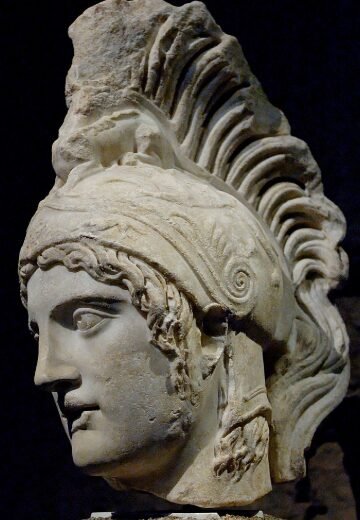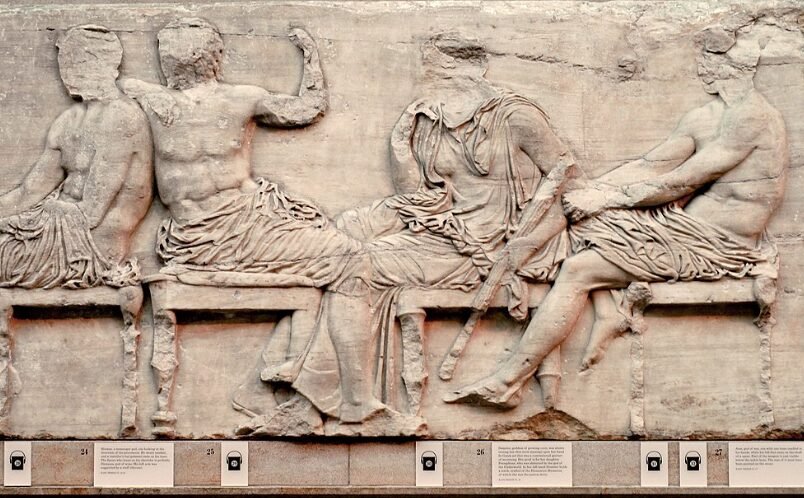The Role of Ares in the Trojan War
Ares, the Greek god of war, occupies a tumultuous and often unflattering role in Greek mythology, particularly during the Trojan War. Unlike his sister Athena, who represents strategic warfare and wisdom, Ares embodies the chaos, brutality, and indiscriminate violence of battle.
His involvement in the Trojan War, as described in Homer’s Iliad and other ancient texts, showcases his impulsive nature, lack of loyalty, and susceptibility to personal passions, all of which ultimately diminish his effectiveness as a divine ally.
Ares and His Allegiances
Ares initially pledged to support the Achaeans (Greeks) during the Trojan War, aligning with Athena and Hera against the Trojans. However, his loyalty wavered when Aphrodite, the divine protector of Troy and his lover, persuaded him to switch sides. This decision marked Ares as a fickle and unreliable god, more influenced by personal desires than a commitment to justice or strategy.
By siding with the Trojans, Ares became an antagonist to Athena and Hera, both staunch supporters of the Greeks. This division among the Olympians reflected the larger chaos of the war, with gods frequently intervening to favor their chosen mortals. Ares’ alignment with Troy was less a calculated decision and more a demonstration of his impulsive nature and susceptibility to Aphrodite’s influence.
Ares on the Battlefield

Ares sided with the Trojans due to his connection with Aphrodite, but his contributions were undermined by his poor strategy and repeated defeats by Athena and Greek heroes. Image: Ares, 2nd–3rd century AD, based on a Greek bronze original by Alkamenes (420 BC), excavated in 1925 at Rome’s Largo di Torre Argentina.
Ares’ contributions to the Trojan War were marked by violence and destruction but lacked the strategic impact of Athena’s interventions. While he brought fear and chaos to the battlefield, his efforts often resulted in humiliation and defeat, particularly at the hands of Athena and her chosen heroes.
Another notable defeat for Ares occurred when Diomedes, a Greek hero empowered by Athena, wounded him with a spear guided by her hand. Ares’ cries of pain reverberated through the battlefield, forcing him to retreat to Mount Olympus.
One of the most notable episodes involving Ares occurred during his confrontation with the Greek hero Diomedes. In The Iliad, Diomedes, emboldened by Athena’s guidance, faced Ares in combat. Athena not only gave Diomedes the courage to challenge the god of war but also guided his spear, enabling him to wound Ares. This injury forced Ares to retreat to Mount Olympus, where he bemoaned his suffering to Zeus. The king of the gods, however, dismissed Ares’ complaints, expressing disdain for his son’s lack of discipline and constant embroilment in conflicts.
According to Homer’s Iliad, Ares was severely injured by a rock hurled by Athena during the conflict. Seeking aid from the Olympian gods, Ares was only assisted by Paieon, the healer god, who nursed him back to health with magical potions and herbs.
This episode highlighted the stark contrast between Ares and Athena. While Athena empowered mortals with wisdom and strategy, Ares’ approach was one of brute force and chaos. His inability to match Athena’s calculated interventions underscored his limitations as a war deity.
Ares’ Continued Failures
Ares’ humiliation during the Trojan War did not end with his defeat by Diomedes. Later in the conflict, he attempted to avenge his earlier injury by confronting Athena directly.
When Zeus allowed the gods to rejoin the battle, Ares seized the opportunity to attack Athena, seeking to settle the score. However, Athena once again demonstrated her superiority by striking Ares with a boulder, incapacitating him and forcing him to retreat once more.
While the Greeks relied on Athena’s tactical brilliance, the Trojans depended on Ares’ brute force and Aphrodite’s influence. Ares, however, proved no match for Athena’s superior strategy.
These repeated defeats not only emphasized Athena’s dominance but also portrayed Ares as a figure of ridicule among the Olympians. His inability to succeed against Athena, coupled with his tendency to act on impulse rather than strategy, made him a less respected and effective divine participant in the war.

When the gods reentered the fray, Ares attempted to attack Athena but was overpowered when she struck him with a boulder. Image: The Mattei Athena at the Louvre is a Roman 1st-century BC/AD copy of the 4th-century BC Piraeus Athena, attributed to Cephisodotos or Euphranor.
The Influence of Aphrodite

During the Trojan War, Ares immersed himself in the battle, siding with the Trojans due to his connection with Aphrodite, their divine protector. Image: Wall painting from Pompeii (c. 20 BC–50 AD) depicts youthful, beardless Mars with Venus, influenced by Greek Ares.
Ares’ relationship with Aphrodite played a significant role in his involvement in the Trojan War. As the goddess of love and beauty, Aphrodite represented a stark contrast to Ares’ violent and aggressive nature. Their romantic connection, however, often led Ares to act irrationally and prioritize his emotions over reason.
Aphrodite’s influence on Ares during the Trojan War was evident in his decision to support the Trojans. She persuaded him to abandon his original allegiance to the Achaeans, redirecting his destructive tendencies to aid her favored city. While this shift demonstrated Ares’ devotion to Aphrodite, it also highlighted his lack of discipline and consistency as a war deity.
Most famously, Hephaestus exposes Ares and Aphrodite’s affair, trapping them in a net and subjecting them to the gods’ ridicule.
Their relationship was not without its humiliations. In one famous myth, Hephaestus, Aphrodite’s husband, discovered her affair with Ares and devised a cunning plan to expose them. Using his skills as a craftsman, Hephaestus trapped the lovers in an unbreakable net, showcasing them to the other gods on Mount Olympus. This episode further tarnished Ares’ reputation, portraying him as a god prone to impulsive passion and public embarrassment.
Ares’ Role in the Death of Ascalaphus
Another significant moment in Ares’ involvement in the Trojan War was the death of his son Ascalaphus, who fought for the Achaeans. When Ares learned of Ascalaphus’ death, he was overcome with grief and anger. Ignoring Zeus’s decree that no Olympian should interfere in the war, Ares sought to rejoin the battlefield to avenge his son.
Athena intervened to prevent Ares from acting impulsively, reinforcing the theme of his lack of control and her superior judgment. This incident underscored the emotional volatility of Ares, who allowed personal feelings to cloud his actions, often to the detriment of his cause.

Ares’s involvement in the Trojan War brought him into direct confrontation with his sister Athena, the goddess of wisdom and strategy, who supported the Greeks. Image: Pallas Athena by Dutch master Rembrandt
Ares as a Symbol of Unchecked Aggression
Throughout the Trojan War, Ares’ actions epitomized the chaos and destructiveness of war. Unlike Athena, who represented the strategic and calculated aspects of conflict, Ares embodied its raw violence and unpredictability. His shifting allegiances and impulsive behavior reflected the darker side of warfare, where emotions and passions often overshadow reason and strategy.
Ares, the Greek god of war, was known for his chaotic and destructive nature, often instigating or exacerbating conflicts wherever they arose.
In literature, Ares served as a foil to Athena, highlighting the Greeks’ preference for intelligent and disciplined warfare over brute force. His defeats and humiliations during the Trojan War reinforced the idea that wisdom and restraint were superior qualities, both in battle and in leadership.
Legacy of Ares in the Trojan War

Ares, though linked to numerous love affairs and children, plays a minor role in Greek mythology and is often humiliated. In the Trojan War, he sides with Troy, influenced by Aphrodite, but ultimately loses to the Greeks, aided by Athena. Image: The Ludovisi Ares, a Roman adaptation of a 320 BC Greek original.
Ares’ role in the Trojan War, as portrayed in The Iliad and other myths, left a complex legacy. While he was a fearsome presence on the battlefield, his lack of strategy and discipline made him an ineffective ally. His repeated defeats, particularly at the hands of Athena, diminished his stature among the Olympians and underscored the limitations of his approach to warfare.
Moreover, Ares’ actions during the Trojan War reflected broader themes in Greek mythology, including the tension between emotion and reason, chaos and order, and violence and strategy. His character served as a cautionary tale about the dangers of unchecked aggression and the importance of wisdom and self-control.
In the end, Ares’ involvement in the Trojan War highlighted the complexities of his character and his role in Greek mythology. As the god of war, he embodied the brutality and destructiveness of conflict, but his shortcomings and humiliations revealed the value of strategy, composure, and intellect, as exemplified by Athena. This contrast not only shaped the narrative of the Trojan War but also reflected the cultural values of the ancient Greeks, who revered wisdom and discipline as essential qualities in both war and life.
Frequently Asked Questions

Ares is the Greek god of war, representing brute force, chaos, and unchecked aggression. Image: Helmeted young warrior, identified as Ares. Roman copy of a Greek original; plaster replica, original in Villa Adriana Museum.
How is Ares often portrayed in mythology?
Ares is frequently depicted as embodying violence and destruction, often overshadowed by his lack of strategy and frequent humiliations, particularly in comparison to Athena.
Why did Ares switch allegiances during the Trojan War?
Although he initially supported the Achaeans, Aphrodite persuaded him to support the Trojans, showcasing his lack of discipline and consistency.
What notable defeat did Ares suffer during the Trojan War?
Ares was wounded by Diomedes, guided by Athena, during the war. His cries of pain shook both sides, and he fled to Mount Olympus for healing.
How did Athena demonstrate superiority over Ares in battle?
Athena not only guided Diomedes to wound Ares but also overpowered him with a boulder when he tried to retaliate later, showcasing her superior strategy and composure.

Ares (right) with Demeter, Dionysus and Hermes on the frieze of the Parthenon, ca. 447–433 BC, British Museum.
What is Ares’ relationship with Aphrodite, and how did it impact his reputation?
Ares had a romantic relationship with Aphrodite, which Hephaestus exposed by trapping them in a net, subjecting Ares to ridicule among the gods.
What does Ares symbolize in Greek mythology?
Ares symbolizes the chaotic and destructive aspects of war, as opposed to Athena, who represents wisdom and strategic warfare.
What literary work highlights Ares’ shifting allegiances during the Trojan War?
Homer’s Iliad describes Ares initially supporting the Achaeans before siding with the Trojans under Aphrodite’s influence.
How did Ares’ personal passions affect his role in mythology?
Ares often acted impulsively, driven by emotions rather than justice or order, leading to his portrayal as a less effective and unreliable god.

The Iliad and other works, such as Aeschylus’ Suppliants, portray Ares as a figure of unbridled aggression and passion, often manipulated by Aphrodite’s influence. His frequent defeats at the hands of Athena highlight the value of strategy and wisdom over sheer force in Greek mythology. Image: Sampling of translations and editions of Iliad in English
What is the significance of Aeschylus’ reference to Ares in Suppliants?
Aeschylus referred to Ares as Aphrodite’s “mortal-destroying bedfellow,” emphasizing his destructive nature and the paradox of his connection with love.
How does Ares’ legacy contrast with Athena’s in Greek mythology?
Ares’ defeats and humiliations highlight the value of wisdom and restraint, as embodied by Athena, over brute force and recklessness.
What lesson does Ares’ mythology convey about war?
Ares’ stories underscore the complexities of war, portraying it as chaotic and destructive rather than honorable or glorious.
Why is Ares considered a cautionary figure in Greek mythology?
Ares’ frequent failures and impulsive actions serve as a reminder of the importance of strategy and discipline over raw aggression.



























